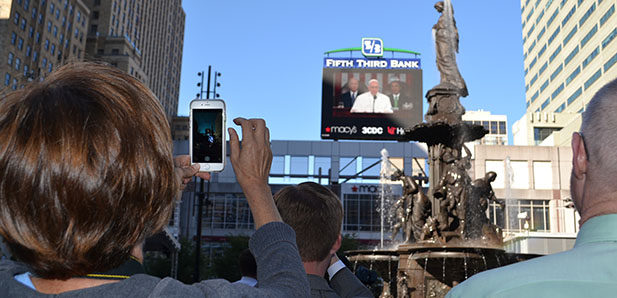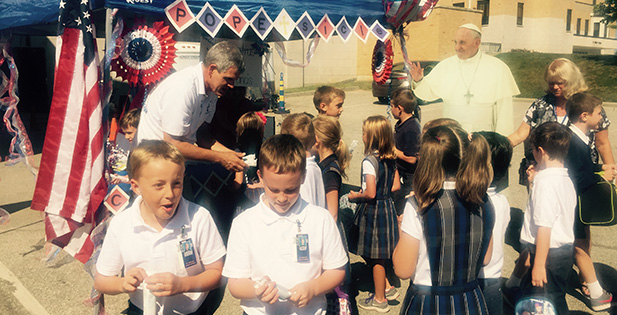Washington won’t be business as usual after papal visit, local delegation predicts
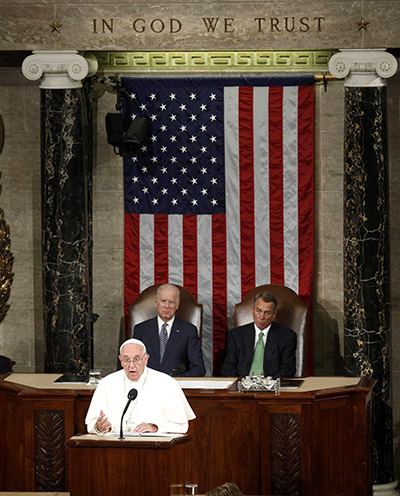
By Menachem Wecker
For The Catholic Telegraph
Washington, D.C. — Two months ago, Benjamin Garcia, a Chilean native studying to become a priest at Catholic University of America, learned he’d play a role in Pope Francis’ Sept. 23 canonization of Junipero Serra at the Basilica of the National Shrine of the Immaculate Conception. Two days before the Mass, he was told he would bear the papal staff.
Standing on the west lawn of the U.S. Capitol, having arrived, one of thousands, hours early to secure a spot to watch the papal address to Congress on jumbotrons, Garcia described shaking the pope’s hand and carrying the ferula, which was thinner than expected.
“My hands are kind of very big; it’s hard to keep it in your hand,” he said. “You carry a cloth to grab it, which makes it harder because it’s light.”
Hours before the pope’s historic address to a joint meeting of Congress, Garcia said he hoped the pope would discuss what he called the country’s two greatest sources of suffering: lack of religious freedom and abortion. He bemoaned the “atrocities of abortion,” which have surfaced in media reports, and the pressure upon Catholics to fund contraception, “which goes against our faith.”
The pope did address those topics and his talk made quite an impression on the local delegation in Washington.
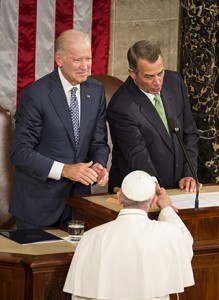
Writing on Medium the day before the speech, House Speaker John Boehner said that he knew only that the pope would speak, sans teleprompter, in English. “That’s all I know about the speech, and all I need to know, frankly,” he wrote. “There’s been so much talk about what the pope will say, and whether he’ll address this or that … The best thing we can all do is listen, open our hearts to his message and reflect on his example.”
In a statement that the speaker’s office released after session, the speaker wrote, “I’m so proud that so many came to greet the pope here at our Capitol, the world’s greatest symbol of democracy. The Holy Father’s visit is surely a blessing for all of us. With great blessings, of course, come great responsibility. Let us all go forth with gratitude and reflect on how we can better serve one another. Let us all go forth and live up to the words, ‘God bless America.’”
The next day Boehner announced his resignation from Congress.
In interviews with The Catholic Telegraph in their offices shortly after the pope’s address, both Rep. Brad Wenstrup and Rep. Steve Chabot agreed that the papal address wasn’t just another world leader coming to talk to Congress.
“We’ve had a lot of heads of state, and I’ve been present for an awful lot of them in that room. We’ve had Prime Minister Netanyahu, of Israel; we’ve had Prime Minister Abe, from Japan; and a whole range of world leaders have spoken, and those are all important speeches to Congress,” Rep. Chabot said. “But this is the first time in America’s history that we’ve ever had a pope address a joint session of Congress. I would commend Speaker Boehner for pulling that off. He’s a Moeller grad — a big deal as a La Salle grad myself, kind of a rival of Moeller — but I give Boehner a lot of credit of having been able to get the pope here.”
Rep. Wenstrup said seeing the assembled crowds outside the Capitol reminded him only of a presidential Inauguration.
“It was extremely unique. There was an anticipation of something that you will never see again. Heads of state we see. That’s exciting as well. But this was above your typical head of state,” he said. “It’s palpable in the moment, like any other speech is. Whether it’s the pope or your football coach, you want to take that message and run with it.”
Asked what he had hoped to hear the pope tell Congress, Rep. Wenstrup, who didn’t have an advanced copy of the papal remarks, said the message of Jesus.
“I wanted to remind people of the message of Jesus Christ as much as anything else. I did find it interesting that he never mentioned Jesus. And he’s a Jesuit,” Rep. Wenstrup said. “Not that it’s that big a deal, but I was surprised that Jesus was never mentioned. … Maybe he was being respectful to the notion that he was speaking to people of many faiths, not only Christians.”
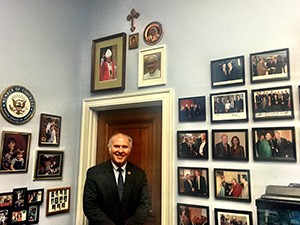
Rep. Chabot, whose office was able to secure an advanced copy, said he hadn’t thought about Jesus not being mentioned. “I kind of hoped for a message of peace — something that would bring Congress and the American people together, and I think the pope accomplished that to a considerable degree,” he said.
He added that he was “particularly pleased” to hear the pope talk about the importance of protecting human life at all stages. (According to a Washington Post transcript, the pope said, “The Golden Rule also reminds us of our responsibility to protect and defend human life at every stage of its development.”)
“He clearly intended by that to voice his opposition to abortion,” Rep. Chabot said. “I’m sure he’s aware, because of Roe v. Wade in this country, it’s now the law of the land, but there are many of us who believe that we ought to not destroy innocent, unborn life, but should protect it. So I was particularly pleased to hear the pope speak about that.”
Rep. Wenstrup, a medical doctor who says he married late in life and was unsure whether he and his wife would be able to have children, agreed. “As a doctor already it’s beyond me how other doctors can make that choice [of abortion],” he said. And he was disappointed to see fellow Catholic members vote against a bill that would protect babies born with a beating heart.
“I’m being very blunt here, but I look at that and I think, ‘Are you serious?’” Rep. Wenstrup said. “At the end of the day, I’m not going to be judged by a governor or the president. I’m going to have to be judged by God. I don’t know how some people come to that conclusion that that’s an OK move.”
Rep. Wenstrup, who noted that the address to Congress was less political than the pope’s statements at the White House the previous day, noted the pope’s “fairly strong comment about climate change, which as a scientist, to me, is arguable, debatable — should be studied.” He added that it’s imperative to be good stewards of the world, “But how we go about it requires thoughtful conversation, and thoughtful approach to how we proceed.”
Both Rep. Wenstrup and Rep. Chabot had good things to say about the first two of four Americans that the pope singled out — Abraham Lincoln and Martin Luther King — and said they didn’t to do more reading up on the other two: Dorothy Day, a Catholic social activist, and Thomas Merton, a Trappist monk.
“I need to be a bit more studying on Thomas Merton and Dorothy Day,” Rep. Wenstrup said.
“It was kind of interesting to hear a pope talk about Abraham Lincoln,” Rep. Chabot said, laughingly admitting that some of his colleagues misheard the pope. “I had guys there saying, ‘Did he say Doris Day?!’ I said, ‘I mean, I’m sure she was a fine American. I don’t think she’d be one of four Americans for the pope to single out,’” he said. “Although she was from Cincinnati, I think. That would have been nice.”
Although his wife, who teaches in a Catholic school, knew of Merton, Rep. Chabot said, “I don’t know if I was absent the day at LaSalle when they talked about him.”
Two other takeaways from the papal talk stood out in Rep. Chabot’s mind: the focus on family – “Cincinnati really is known as being a family town, where people put family or what high school they went to, over almost anything else. The fact that the pope emphasized that will resonate with people in Cincinnati.” — and the pope’s humility, epitomized by shuttling around D.C. in a Fiat.
“Generally up here in Washington, the big shots travel around in big, black limousines, and the pope is in this little Fiat. I like that a lot. It made a difference,” Rep. Chabot said. “It makes me kind of proud to be a Catholic; the leader of the church that I’ve belonged to since I was born and baptized, first communion and confirmation and all the rest, it feels good to have someone at the top that is that good a man, that good a person.”
Garcia, who bore the papal staff at the canonization, noted that symbolism can be very powerful under the right conditions.
“Someone can see the pope and change his life, like someone can see the cross and it’ll change his life. At the same time, someone can see the cross everyday and not change anything,” he said. “Many times we don’t stop to reflect on what we are seeing and hearing. This means more than just people standing to see an old guy with a white robe.”
Posted Sept. 28, 2015










